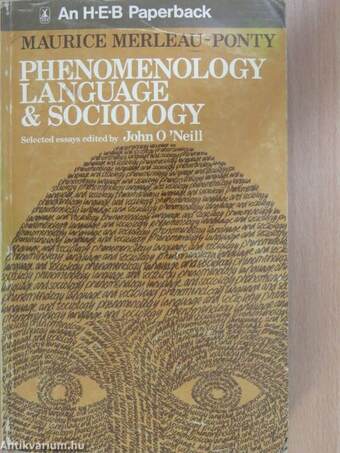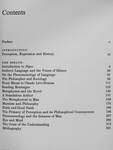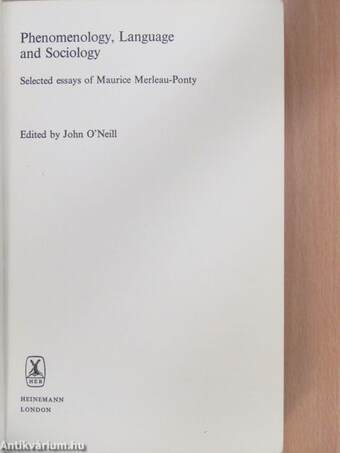1.066.403
kiadvánnyal nyújtjuk Magyarország legnagyobb antikvár könyv-kínálatát

VISSZA
A TETEJÉRE
JAVASLATOKÉszre-
vételek
Phenomenology, Language and Sociology
Selected essays
| Kiadó: | Heinemann Educational Books Ltd |
|---|---|
| Kiadás helye: | London |
| Kiadás éve: | |
| Kötés típusa: | Fűzött papírkötés |
| Oldalszám: | 352 oldal |
| Sorozatcím: | H. E. B. Paperback |
| Kötetszám: | |
| Nyelv: | Angol |
| Méret: | 22 cm x 14 cm |
| ISBN: | 0-435-82667-0 |
naponta értesítjük a beérkező friss
kiadványokról
naponta értesítjük a beérkező friss
kiadványokról
Fülszöveg
The essays collected in this volume demonstrate the pattern of
Merleau-Ponty's phenomenological reflections upon language,
politics and the social sciences. The reader will be able to follow
the development of Merleau-Ponty's thought through his patient
analysis of the presuppositions of the social sciences as well as his
dialogue with the political experience of Marxism and
existentialism. Throughout the essays the reader is drawn into
Merleau-Ponty's fascination with language and symbols, the
wonder of art and vision, with the ambivalence of history and
political action. Although Merleau-Ponty's thought is
unfinished its path may be found in the direction of a radical
ontology of nature, truth and philosophical interrogation which is
at the same time the foundation for a theory of social, political and
cultural institutions. Merleau-Ponty understood the whole of
human culture as a search into the past to which our own presence
is essential and for the same reason... Tovább
Fülszöveg
The essays collected in this volume demonstrate the pattern of
Merleau-Ponty's phenomenological reflections upon language,
politics and the social sciences. The reader will be able to follow
the development of Merleau-Ponty's thought through his patient
analysis of the presuppositions of the social sciences as well as his
dialogue with the political experience of Marxism and
existentialism. Throughout the essays the reader is drawn into
Merleau-Ponty's fascination with language and symbols, the
wonder of art and vision, with the ambivalence of history and
political action. Although Merleau-Ponty's thought is
unfinished its path may be found in the direction of a radical
ontology of nature, truth and philosophical interrogation which is
at the same time the foundation for a theory of social, political and
cultural institutions. Merleau-Ponty understood the whole of
human culture as a search into the past to which our own presence
is essential and for the same reason opens us to the future and the
drama of a universal culture. At the same time, no one is more
responsible than Merleau-Ponty in the effort to come to grips with
the alternations of sense and nonsense which beset the path of
reason as a human institution.
The introductory essay by John O'Neill provides a careful and
sympathetic treatment of the major themes of perception, politics
and language as they interweave in the unique style of Merleau-
Ponty's thought. To this task O'Neill brings the experience of
having translated Merleau-Ponty's Humanism and Terror,
Themes from the Lectures at the College de France 1952-1960 and
The Prose of the World.
the author
Merleau-Pon^y (1908-1961) graduated from L'Ecole Normale in
1930 and returned to teach on the faculty in 1935. His major work,
Phenomenology of Perception, was published in 1945. From 1945-
1952 he was co-editor with Sartre of Les Temps Modernes. From
1950-1952 he was Professor of Psychology and Pedagogy at the
Sarbonne. In 1952 he became the youngest philosopher ever
appointed to the chair at the College de France, once held by
Henri Bergson. His later works continued to treat problems of
Marxism, phenomenology, language, literature and the arts.
the editor
John O'Neill is Professor of Sociology at York University.
Toronto. He has lectured in England, France, Germany, Italy and
Israel. He is an editor of the international journals Philosophy of
the Social Sciences and The Human Context. As well as translating
three of Merleau-Ponty's works, Professor O'Neill has translated
Jean Hyppolite's Studies on Marx and Hegel. He is the author of
Sociology as a Skin Trade and editor of Modes of Individualism
and Collectivism. Vissza
Témakörök
- Filozófia > A szerző származása szerint > Francia
- Idegennyelv > Idegennyelvű könyvek > Angol > Nyelvészet
- Idegennyelv > Idegennyelvű könyvek > Angol > Filozófia > Nemzetisége szerint > Francia
- Nyelvészet > Egyéb
- Filozófia > Témaköre szerint > Tanulmányok, esszék
- Filozófia > Témaköre szerint > Szakfilozófiák
- Szociológia > Tanulmányok, esszék
- Filozófia > Témaköre szerint > Filozófiatörténet > Irányzatok
- Idegennyelv > Idegennyelvű könyvek > Angol > Szociológia > Tanulmányok, esszék
- Idegennyelv > Idegennyelvű könyvek > Angol > Filozófia > Témaköre szerint > Tanulmányok, esszék
- Idegennyelv > Idegennyelvű könyvek > Angol > Filozófia > Témaköre szerint > Szakfilozófiák
- Idegennyelv > Idegennyelvű könyvek > Angol > Filozófia > Témaköre szerint > Filozófiatörténet > Irányzatok
- Filozófia > Témaköre szerint > Társadalomfilozófia > Egyéb
- Idegennyelv > Idegennyelvű könyvek > Angol > Filozófia > Témaköre szerint > Társadalomfilozófia > Egyéb
Maurice Merleau-Ponty
Maurice Merleau-Ponty műveinek az Antikvarium.hu-n kapható vagy előjegyezhető listáját itt tekintheti meg: Maurice Merleau-Ponty könyvek, művekMegvásárolható példányok
Nincs megvásárolható példány
A könyv összes megrendelhető példánya elfogyott. Ha kívánja, előjegyezheti a könyvet, és amint a könyv egy újabb példánya elérhető lesz, értesítjük.







